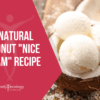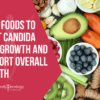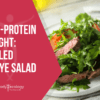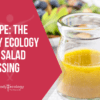Could Your Multivitamin Be Making You Sick?
According to two large studies released this past month, there is reason to reconsider popping your one-a-day multi. (1)
These two studies make the argument that multivitamin supplementation may actually be causing more harm than good in the body.
One study looked at vitamin E in the body and its relationship to prostate cancer. The study, called the SELECT trial, was published in the Journal of the American Medical Association. The SELECT trial found that, contrary to general opinion, vitamin E slightly increases the chance of prostate cancer. The study also points out that taking selenium with vitamin E seems to reduce this risk. (2)
 Before you pop that pill… Choosing the right supplement with essential vitamins and minerals can protect your health by supporting digestive function and aiding in detoxification.
Before you pop that pill… Choosing the right supplement with essential vitamins and minerals can protect your health by supporting digestive function and aiding in detoxification.The second study to raise alarm was published in the Archives of Internal Medicine. Known as the Iowa Women’s Health Study, researchers gathered information from a large pool of 38,000 women that averaged 61 years old. The results? Over time, from 1986 to 2008, it was determined that multivitamin use was linked with a slight increase in the risk of mortality or death. (3)
What These Studies Failed to Discuss:
The quality of the supplement and multivitamin. This piece of information is what is called a confounding variable.
For example, there are eight natural forms of vitamin E.
- Most inexpensive, synthetic multivitamins and even skin creams contain only one form, called alpha-tocopherol.
- Only including alpha-tocopherol in a formula decreases the protective action of other forms of vitamin E in the body.
- When taking vitamin E, it should be in the natural form of d-alpha-tocopherol and combined with 50% as much mixed tocopherols.
One significant confounding variable in the Iowa Women’s Health Study: twice as many women in the group that were taking supplements were also taking synthetic hormones, like premarin or provera.
Did you know that these synthetic hormones, like premarin and provera, are now known to cause things like cancer, heart disease, and stroke? The Iowa Study did not account for this significant confounding variable.
Many of us know that:
- Soil does not have the same nutrient profile as it did 100 years ago.
- The nutrient profile of plants reflects the depleted soil our veggies are grown in.
- The way that we raise animals is cluttered, toxic, and unnatural.
- Our bodies eventually get sick from eating too much poor quality food.
Most medical experts and nutritionists, including the ones involved in the recently published studies, will tell you that quality food and daily exercise is the best thing you can do for your health. This is because eating the right foods or choosing supplements that are based on Mother Nature can harmonize whole systems in the body.
- Supporting digestive function with enzyme supplementation is broad spectrum, treats whole systems, and has multiple benefits.
- When we open up detoxification pathways with liver support, like with Body Ecology LivAmend, we help multiple systems in the body to function as they should, and we create balance.
Synthetic and isolated supplementation – that you may or may not need – is a bit like stumbling around in the dark. Not only that, but keep in mind that most of the time these synthetic nutrients are useless or even harmful in the body because they simply aren’t packaged the way that Mother Nature intended.
When we use herbs, food, and whole-food nutrients to support entire systems in the body, such as the digestive system or detoxification pathways, we restore balance and optimize health.
The answer is: it is possible. There is a marked difference between poor quality and synthetic supplements compared to the nutrients found in a high quality, food-based supplement. Unfortunately, researchers did not investigate what kinds of supplements were involved in the SELECT trial and Iowa Women’s Health Study. They also did not account for other confounding variables, like hormone replacement therapy.
Choose Nutrient-Dense Foods!
If you are crunched for time and you do not have the hours to cook like grandma did, try these:
- Pull out your slow cooker in the morning and let both meat and bone slowly dissolve into a delicious dinner.
- An alternative to bone broth, which can take anywhere from 12 – 72 hrs to prepare, is powdered gelatin. Try mixing powdered gelatin into a smoothie. When replacing bone broth, go for high quality bulk powdered gelatin rather than the encapsulated form.
- Consider making your own with Body Ecology Veggie Culture Starter. Once you get into the habit of tossing some veggies in your food processer and packing jars with the veggies and a starter culture, you will wonder why these simple steps were ever forgotten about in the first place.
What to Remember Most About This Article:
Two recent studies have raised questions about taking daily multivitamins, linking daily supplement use to prostate cancer and a slight increase in mortality. However, these studies failed to examine the quality of the supplements that were taken.
Today, it has become common knowledge that our soil is not as rich as it was a century ago. This nutrient depletion has caused poor quality in our food supply. Supplementation can be used to fill in these nutritional gaps.
However, taking a poor quality supplement could make a bad health condition even worse. Take the time to choose beneficial, natural supplements that will support digestive function and aid in detoxification. When cooking at home, opt for nutrient-dense foods that pack a punch to boost your health and strengthen your immune system.
Product Recommendations:
- [product id=”16″]
- [product id=”13″]
- [product id=”169″]
- [product id=”21″]
REFERENCES:
- Wang, Shirley. Is This the End of Popping Vitamins? The Wall Street Journal. Oct 25, 2011. http://online.wsj.com/article/SB10001424052970204644504576650980601014152.html
- Klein RA et al. JAMA 2011;306:1549-1556, PMID: 21990298
- Mursu, Jaakko, et al. Dietary Supplements and Mortality Rate in Older Women: The Iowa Women’s Health Study. Arch Intern Med. 2011;171(18):1625-1633.








